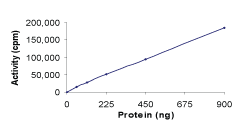
TIE2, Active(T04-11G)
FOR BULK ORDER REQUESTS PLEASE CONTACT US
Description :Recombinant human TIE 2 (771-end) was expressed by baculovirus in Sf9 insect cells using an N-terminal GST tag.
Species :Human
Tag :GST tag
Expression System:Sf9 insect cells using baculovirus
Sequence :771-end
Genbank Number :NM_000459
Specific Activity :Sample Kinase Activity Plot. For specific information on a given lot, see related technical data sheet.
Purity :Sample Purity Data. For specific information on a given lot, see related technical data sheet.
Storage, Stability and Shipping :Store product at –70oC. For optimal storage, aliquot target into smaller quantities after centrifugation and store at recommended temperature. For most favorable performance, avoid repeated handling and multiple freeze/thaw cycles.
Applications :Kinase Assay, Western Blot
Molecular Weight :~61 kDa
Gene Aliases :TEK, VMCM, VMCM1, CD202B
Scientific Background :TIE 2 or TEK is a receptor tyrosine kinase that is expressed principally on vascular endothelium. Disrupting TIE 2 function in mice results in embryonic lethality with defects in embryonic vasculature, suggesting a role in blood vessel maturation and maintenance. Angiopoietin-1 is a secreted growth factor that binds to and activates the TIE 2 receptor tyrosine kinase (1). SHP2 and GRB2 are recruited to the activated TIE 2 kinase domain and are part of the cellular responses that mediate TIE 2 function. TIE 2 expression is upregulated in the endothelium of vascular "hot spots" in human breast cancer specimens. However, TIE 2 is also overexpressed in areas of active angiogenesis in normal tissues (2).
References :
1. Woolf, A S. et al: Angiopoietin growth factors and Tie receptor tyrosine kinases in renal vascular development. Pediatr Nephrol. 2001 Feb;16(2):177-84.
2. Peters, K G. et al: Functional significance of Tie2 signaling in the adult vasculature. Recent Prog Horm Res. 2004;59:51-71.
Product Sheets (By Lot #) :
Research Areas :Cancer, Neurobiology, Inflammation, Cardiovascular Disease, Angiogenesis, Receptor Tyrosine Kinases, Cancer, Neurobiology, Inflammation, Cardiovascular Disease, Angiogenesis, Receptor Tyrosine Kinases
